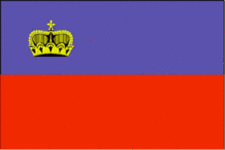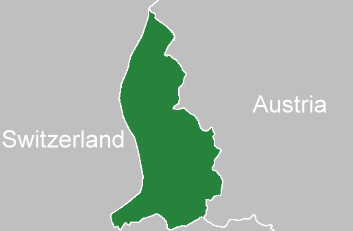Liechtenstein
 Flag of Liechtenstein | |
| Capital | Vaduz |
| Inhabitants | 35'894 |
| Language(s) | German |
The Principality of Liechtenstein was established within the Holy Roman Empire in 1719; it became a sovereign state in 1806. Until the end of World War I, it was closely tied to Austria, but the economic devastation caused by that conflict forced Liechtenstein to conclude a customs and monetary union with Switzerland. Since World War II (in which Liechtenstein remained neutral) the country's low taxes have spurred outstanding economic growth. However, shortcomings in banking regulatory oversight have resulted in concerns about the use of the financial institutions for money laundering.
Contents |
History
- 4000 - 1800 BC: First settlements in Liechtenstein.
- As of 15 BC: Roman occupation of the Rhine Valley
- 300 - 700 AD: Alemanni settle in Liechtenstein
- 1342: Formation of the County of Vaduz
- 1396: Bestowal of Imperial Immediacy
- 1499: Swabian War
- 1647: Thirty Years War
- 1699: Prince Johann Adam Andreas of Liechtenstein purchases the Lordship of Schellenberg and in
- 1712: the County of Vaduz
- 1719: Elevation of Vaduz and Schellenberg to the Imperial Principality of Liechtenstein
- 1799: Occupation by the French
- 1806: Sovereignty by membership of the Rhenish Confederation
- 1815: Member of the German Confederation
- 1852: Customs Treaty with Austria
- 1862: New Constitution which provided for a Diet as representative of the people
- 1866: Dissolution of the German Confederation - Independence
- 1868: Army disbanded
- 1914 - 1918: World War I with severe economic consequences for Liechtenstein
- 1919: Abrogration of the Customs Treaty with Austria
- 1921: Postal Treaty with Switzerland. Promulgation of the Constitution which in essentially is still valid today
- 1923: Customs Treaty with Switzerland
- 1924: Enactment of the Customs Treaty with Switzerland, Swiss Franc official currency
- 1927: The Rhine inundation, near Schaan
- 1938: Prince Franz Josef II is the first Prince of Liechtenstein to take up permanent residence in Liechtenstein
- 1939 - 1945: World War II, Liechtenstein remains neutral as in World War I, but under better economic conditions than in World War I
- 1945: Beginning of the economic upturn
- 1950: Membership of the International Court of Justice at The Hague
- 1960: Participation in the European Free Trade Association (EFTA)
- 1972: Supplementary agreement to the agreement between the European Economic Community (EEC) and the Swiss Confederation
- 1978: Membership of the European Council
- 1980: Currency agreement between the Principality of Liechtenstein and Switzerland
- 1982: Signing of the European Human Rights convention for the protection of human rights and basic liberties
- 1984: Introduction of women's suffrage
- 1985: Pope John Paul II visits the Principality
- 1989: Parliament increased to 25 Members. Demise of Prince Franz Josef II; succession of Prince Hans-Adam II on 13 November 1989
- 1990: Inauguration of Prince Hans-Adam II. Membership of United Nations (UNO)
- 1991: Membership of EFTA
- 1995: Membership of the European Economic Area (EEA) and of the World Trade Organisation (WTO)
Culture
Arts
Liechtenstein does not have a strong tradition in the arts. The language is German, although it has its own quirks and variants. The architecture varies according to region, but houses generally have ridged roofs with wide, overhanging eaves, and balconies and verandahs enlivened by colourful displays of flowers.
Food
Liechtenstein's food borrows from its larger neighbours, and it is generally good quality but expensive. Basic restaurants provide simple but well-cooked food, although budget travellers may want to live out of the supermarket fridge. Soups are popular and usually very filling, and cheeses form an important part of the diet, as do rosti (fried shredded potatoes) and wurst (sausage).
Wine
Wine is considered an integral part of the meal. The local wines are good, but as they're rarely exported you'll probably have never heard of them.
Source: lonely planet
Events
coming soon...
National holidays
- Jan 1: New Year's Day
- Jan 2: St Berchtold's Day
- Jan 6: Epiphany
- Feb 2: Candlemas
- Mar 19: St Joseph's Day
- May 1: Labour Day
- Aug 15: Assumption (National Holiday
- Sep 8: Nativity of Our Lady
- Nov 1: All Saints' Day
- Dec 8: Immaculate Conception
- Dec 24: Christmas Eve
- Dec 25: Christmas Day
- Dec 26: St. Stephens Day
- Dec 31: New Year's Eve
Embassies
- Consulate of Saint Vincent and the Grenadines in Vaduz, Liechtenstein
- British Consulate in Vaduz, Liechtenstein - Postfach 70 Stadtle 7 FL-9490 Vaduz Tel: + (41) (75) 236 1414 Fax: + (41) (75) 232 8728
- Swedish Consulate in Vaduz, Liechtenstein - Altenbach 8 Postfach 367, Vaduz. Postal Code: FL-9490 Tel: + (41) 423 232 42 57, Fax + (41) 423 235 22 90
